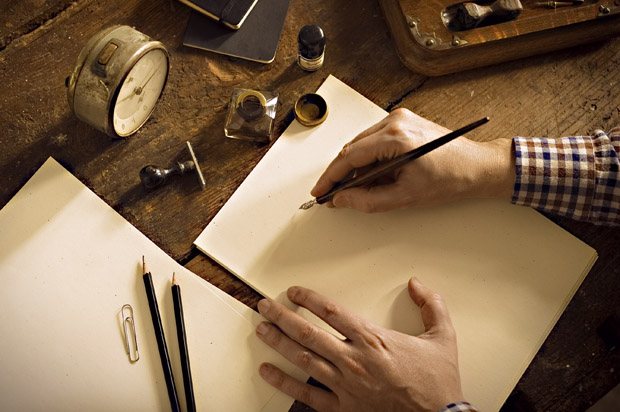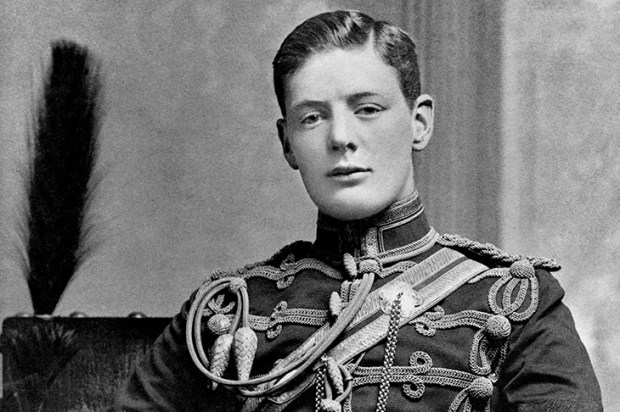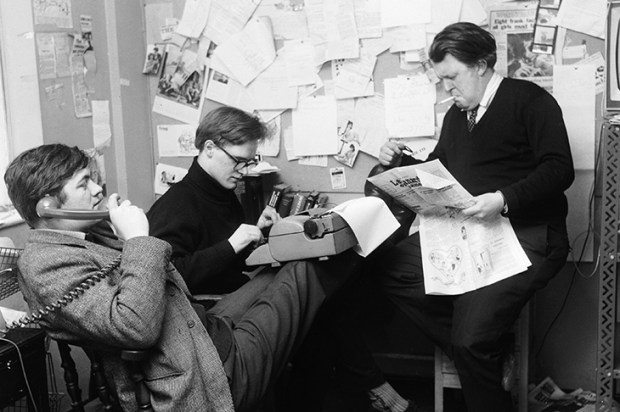I’ve just learned by heart another poem — my first in nearly 30 years. The one I chose was A.E. Housman’s ‘On Wenlock Edge’, not for any special reason other than that it’s part of the canon and that it happened to be in an anthology conveniently to hand by the bath when I decided to embark on this new venture.
When I started, it was purely for the mental exercise. (I mean, nice though it is to be able to quote lines of verse, I can’t conceive of many circumstances when I’ll be able to wheel out a phrase like ‘When Uricon the city stood’ and be congratulated for my insight, erudition and pertinency.) But what I discovered during the four baths it took me to pick up those five stanzas is something I’d never properly appreciated before: that to memorise a poem is to inhabit and understand it in a way rarely possible when you just read it. Let me show you, with reference to the first verse.
On Wenlock Edge the wood’s in trouble
His forest fleece the Wrekin heaves
The gale, it plies the saplings double
And thick on Severn snow the leaves.
One of the problems with poetry, the reason most of us read it less often than prose, is that it requires so much attention. Reading a novel is like completing a marathon, but that doesn’t mean that reading a poem is like doing the 100 metres. Rather, it’s another experience entirely, more akin, say, to solving a crossword puzzle with a slight headache while smoking opium. Especially if it’s someone a bit difficult, like Auden.
When you read sustained prose you can afford to skip over stuff. It doesn’t matter if you miss the odd metaphor, because plot and character and style are the thing and there are plenty enough pages to pick up on those. With a poem, though, you have to pay attention. That word ‘snow’, for example. On first glance — mine anyway — you might come away with the impression that Housman is describing a wintry landscape. Which I don’t think he is. Rather he’s borrowing, for effect, snow’s chill and falling thickness. More likely we’re in autumn.
Writing poetry is all about the edit. It’s why poets’ manuscripts are so oddly gripping, because you can watch the masters at work, earning their reputation, honing the quotidian and the predictable into the — well this is the idea, anyway — unimprovable. Learning a poem is a good way of experiencing this creative process because, like the poet, you’re compelled to weigh each word.
This is especially true when you’re older and you find the learning process harder, which means you repeatedly find yourself having to correct words you’ve misremembered. ‘Bends’, for example, which Housman would almost certainly have considered first, before settling on the much harder-won and more lyrical and satisfying-on-the-tongue ‘plies’. That uneasy ‘heaves’ obviously serves the function of rhyming with ‘leaves’ but I expect that in an early mental draft it was something more conventional like ‘shakes’.
The short words, harder to get right, are sometimes even more instructive. Note how, instead of ‘Its’ at the beginning of line two, Housman preferred to personify the wood with ‘His’, launching into an arresting — if deeply weird — image of the leaves (or trees) being like wool on a ginormous, Wrekin-shaped sheep.
Is it any good? Well I like it very much. But as often with popular poetry, it feels a guilty pleasure. Housman’s voice is an odd — though very charming — mix of archaic, literary and folksy, and I can just imagine some snootier critics taking issue with his creaky use of words like ‘’twas’ and poeticisms like ‘the gale, it’ — or indeed the fact that it rhymes and has a lilting metre.
Really, though, that’s just snobbery. It’s a sad and unnecessary symptom of the same problem many of us have with our favourite poet Betjeman: this fear that by liking something so delightful and accessible we’re selling our intellects short, cheapening our taste. We feel more comfortable venerating stuff that’s pitched slightly over our heads.
Alan Bennett — who’s clearly a lot better at literary criticism than he is at political analysis — has a more sophisticated take on this in that bathside anthology I mentioned. He produced it for a 1990 Channel 4 series called Poetry In Motion and I urge you to track down a copy, because his aperçus are quite brilliant. He writes: ‘An artist can be diminished by his virtues and one of Betjeman’s virtues is clarity. However much the reader welcomes clarity, some of the most memorable moments in poetry occur when it isn’t clear what the poet is talking about. Auden has many such moments, but Betjeman never, because he is always sure, and that’s the penalty of being lucid.’
Bennett, an Oxford man, shows an attention to detail worthy of Cambridge, where they tend to go much bigger on close practical criticism. It was never something I much enjoyed myself. I hate the way, at school, you go laboriously through poems, mechanically picking apart the images, noting the rhyme scheme, underlining repetitions and so on. It sucks all the pleasure out, as I was reminded when I tried helping Girl with one of her GCSE practice papers, comparing how two poems dealt with the theme of ‘man’s inhumanity to man’.
Problem is, I’m not sure there’s any way round it. You can’t do maths till you’ve learned your times tables. You can’t — or so I’d argue — do meaningful abstract art till you’ve first mastered still life. In the old days schools understood the importance of rote learning, and I’m sure in the better ones these traditions still survive. When Michael Gove argued for learning poetry in schools he was mocked as a fuddy-duddy. But, as so often, he was dead right.
The post What you learn when you learn a poem by heart appeared first on The Spectator.
Got something to add? Join the discussion and comment below.
Get 10 issues for just $10
Subscribe to The Spectator Australia today for the next 10 magazine issues, plus full online access, for just $10.
You might disagree with half of it, but you’ll enjoy reading all of it. Try your first month for free, then just $2 a week for the remainder of your first year.















Comments
Don't miss out
Join the conversation with other Spectator Australia readers. Subscribe to leave a comment.
SUBSCRIBEAlready a subscriber? Log in